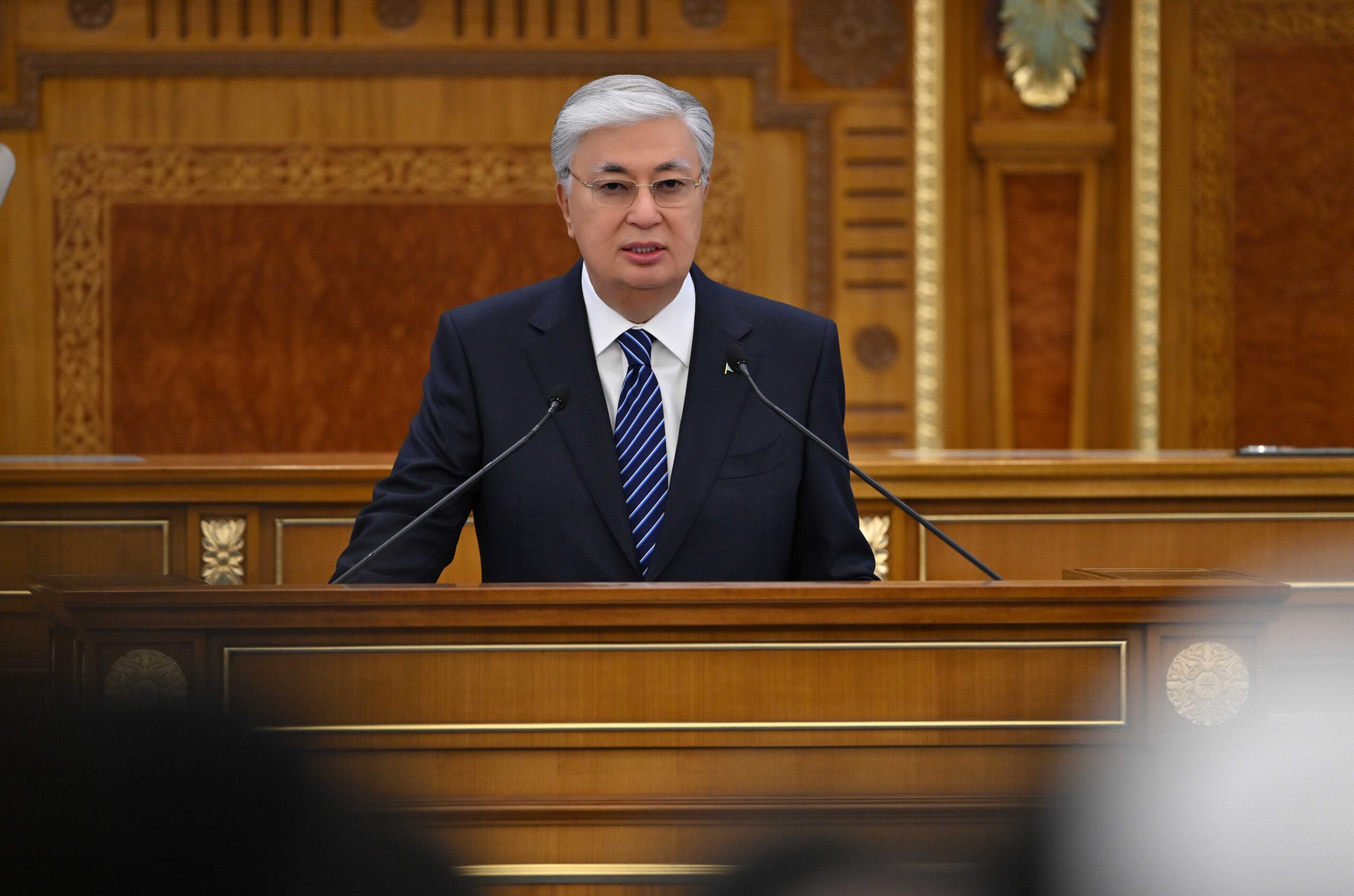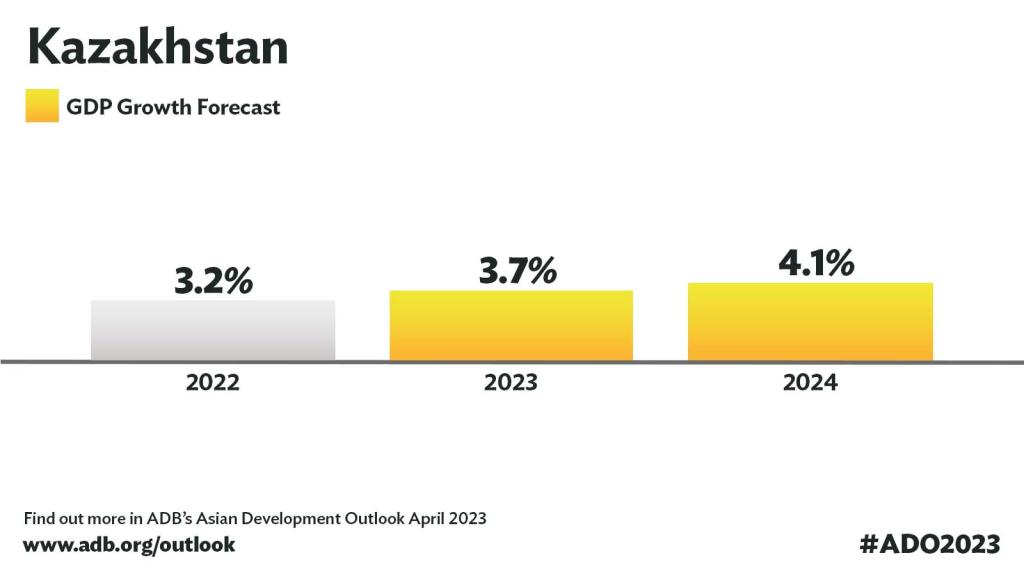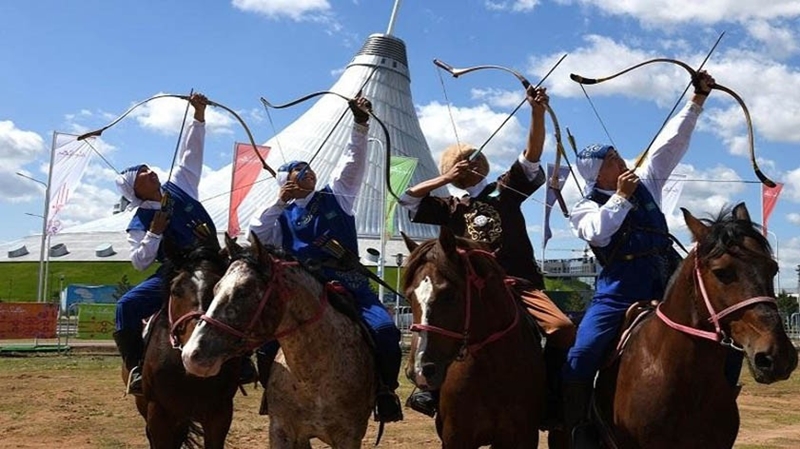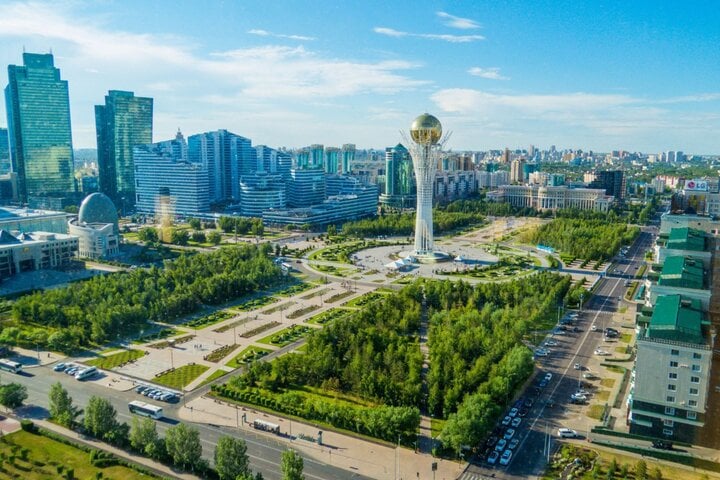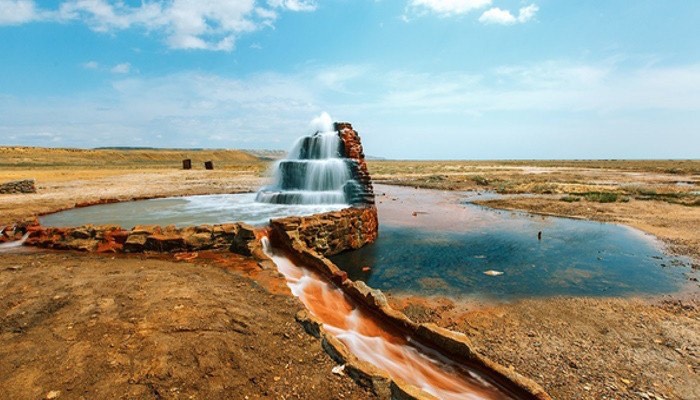TOKAYEV’s EYES TO IMPROVE LIFE QUALITY AND CREATE OPPORTUNITIES FOR ALL, SETS NEW HUMANITARIAN AND IDEOLOGICAL BENCHMARKS
Hanoi, 27 March 2024
On 15 March 2024, H.E. Mr. Kassym-Jomart Tokayev, President of the Republic of Kazakhstan, convened in the Western Kazakhstan’s city of Atyrau the Third meeting of the National Congress (Ulttıq Qurıltay) of the Republic of Kazakhstan.
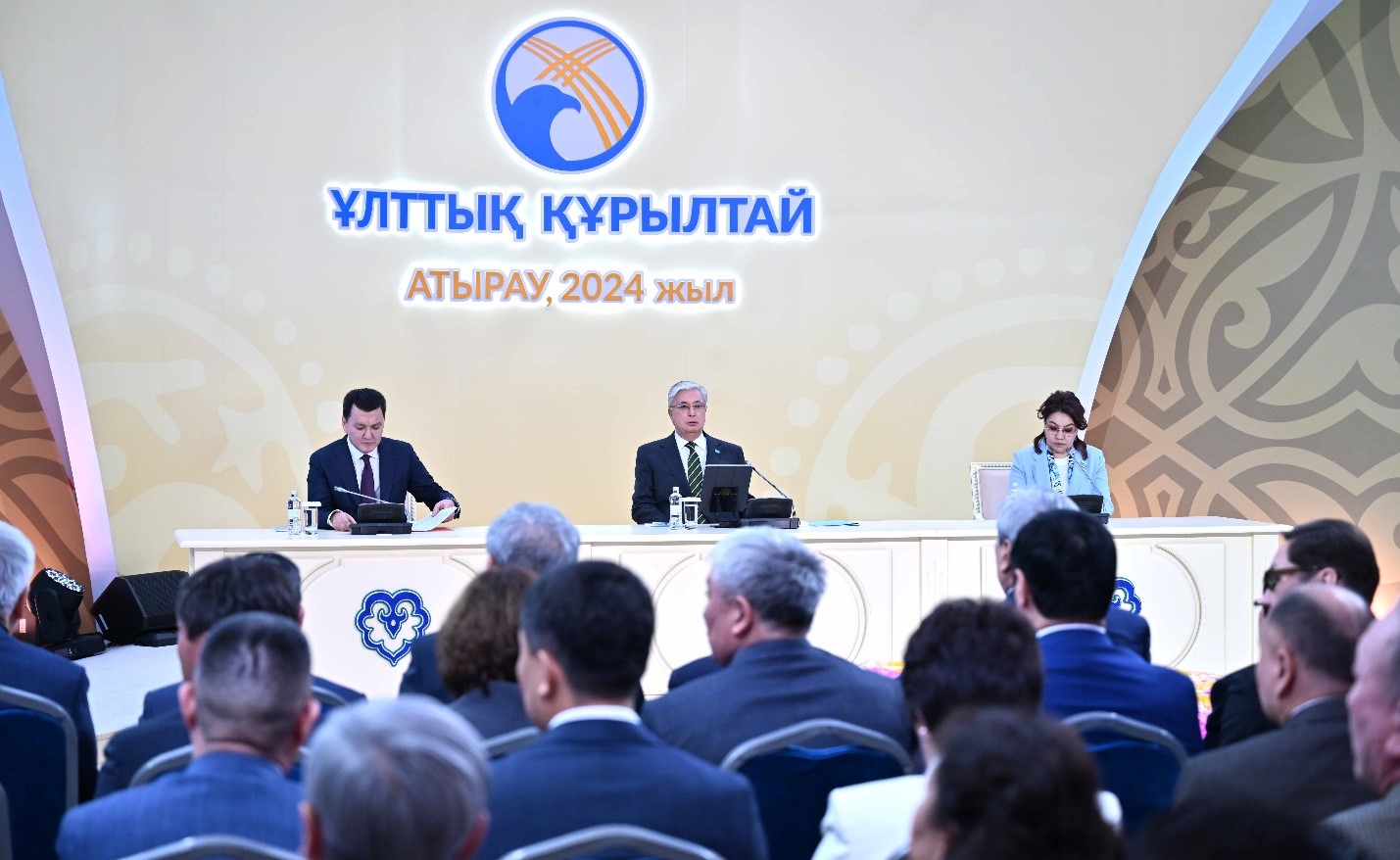
Reference: The National Congress is a consultative and advisory body under the President of the Republic of Kazakhstan. Its main goal is to develop ideas and steps for the further development of social cohesion in the country. This important body is guided in its activities by the Constitution, laws of the Republic of Kazakhstan, acts of the President, other normative legal acts and regulations. The main objectives of the National Congress are:
- development and submission of proposals for the development of social cohesion, promotion and strengthening of national values;
- ensuring constructive dialogue between representatives of the public, political parties, non-governmental sector and government bodies;
- carrying out other activities within its competence that do not contradict the Kazakh national legislation.
Composition of the National Congress: This body consists of the Chairman (President of Kazakhstan), two Deputy Chairmen (State Councillor and Member of Senate), Members and Secretary (Minister of Culture and Information).
The Chairman exercises general management of the activities of the National Congress; determines the place and time of its meetings; gives instructions to the Deputy Chairmen, Members and Secretary. The State Councillor, Deputy Chairman, approves the agenda of the National Congress meetings and exercises other powers on instructions from the Chairman.
The composition of the National Congress is formed from a number of well-known government and public figures, representatives of political parties, the non-governmental sector, business associations, the expert community and public councils of Kazakhstan’s regions, cities of republican significance (Almaty and Shymkent), and the capital (Astana). Periodically, the composition of the National Congress shall be updated on rotational basis.
Members of the National Congress have the right to:
- make proposals to the presidium of the National Congress on its Plan of Action, Agenda of its meetings and Rules of Procedure and Discussing Items;
- participate in the preparation of materials for meetings of the National Congress;
- take part in the discussion and clarification in society the issues, considered at the meetings of the National Congress.
The annual meetings of the National Congress members have now become a cherished tradition of a New Kazakhstan (Second Republic). After hosting the inaugural meeting in 2022in Ulıtau, the cradle of the Kazakh nation, and in 2023 in Turkistan, the Spiritual Capital of the Turkic World, this year’s gathering convened in another historically significant region of Atyrau, nearby Sarayşıq, the historical capital of the Left Wing of the Ulus (State) of Jochi, world-famous as the Golden Horde (1224-1459). It was vital administrative and commercial hub not only of the Golden Horde, but also the Kazakh Khanate (1465-1824). Situated along the Great Silk Road, Sarayşıq played a crucial geostrategic role, fostering extensive economic, political, and cultural exchanges between the East and West.
The previous two meetings of the National Congress saw the launch of significant initiatives for the country’s progress, many of which have already been realised. Positive transformations are underway in various sectors and domains. Undoubtedly, this trend will be continued in the years ahead.
In this vein, in early February 2024, the government of Kazakhstan was changed and given new tasks, inter alia, to ensure shift towards new Just and Fair Kazakhstan, with modernised economic policy and ideology.
This time the theme of the National Congress was “Fair Citizen – Fair Labour – Fair Wages”. It was devoted to strengthening national identity and ensuring dynamic development of the country by setting new benchmarks in the cultural, humanitarian, and ideological spheres, as well as improving the quality of life and creating broad opportunities for the realisation of the potential of all citizens.
MAIN TOPICS OF THE PRESIDENTIAL ADDRESS WERE:
I. STRENGTHENING UNITY OF THE NATION
It was the first and foremost imperative set by President Tokayev. Yet, the nation united by shared aspirations will always forge ahead, never lagging behind. Remarkably, this task announced at the Holy Islamic Month of Ramadan and on the eve of Turkic New Year (Nauryz), celebrated on the Day of Vernal (Spring) Equinox. It is necessary to highlight that this pre-Islamic holiday symbolises the rebirth of nature and life. Yet, the gathering of the Nation Congress at this special time contribute to the advancement and reinforcement of progressive social values, as well as innovation and modernisation that are vitally essential pathways to progress. The intelligentsia, particularly the elder generation, play a significant role in nurturing the nation’s unity. They embody the essence and pride of the nation.
The unity of the people commences with the unity of its intelligentsia. In other words, unity and harmony among prominent and respected figures in the society are extremely important. They ought to set a precedent and engage in discussions on substantial and innovative subjects that strengthen national unity and foster the proper upbringing of the younger generation. Mutual recognition and respect among Kazakhstan’s prominent figures will strengthen the nation’s cohesion.
1) Ideological sphere. Taking comprehensive approach, outlining guidelines not only in the socio-economic realm, but also in the ideological sphere. Scrutinising and finding historical truth. Inter alia, about the role and origins of Turkic Empire, Genghis Khan Empire, the Kazakh movement and autonomous state ALASH (1917-1920), as well as Kazakh figures of Soviet era.
Yet, history should serve as a unifying factor for the nation. Intellectuals must pay special attention to strengthening the unity of the nation. The older generations should lead the way, giving young people the right guidelines and instructions. It is important to emphasise nationwide values and key concepts that embody the ideals of the statehood, such as Independence, Republic, and Unity. People who put national interests above personal interests should be an example for all. This is especially relevant in today’s geopolitical situation.
2) Expanding the scope of the Kazakh language. This task will remain a key priority of state policy. Every year, the demand for the Kazakh language grows, as it becomes the language of business, technology, and science. Education is the best way for the further progressive development of the language.
3) Empowerment of youth and enhancing reading culture. The younger generation in Kazakhstan will soon possess all the opportunities to be creative and gain new knowledge. Foremost, government and society must instil in young people a love of reading. This is the only way to be a reading nation. In is necessary to promote libraries is a treasury of the memory of the state and nation, storage of valuable historical sources and materials. Wonderful modern 24-hour libraries will soon be inaugurated in Almaty and Astana. The Governors of other regions will continue this good experience. Kazakhstan will establish a National Book Day. It will be filled with real content, including various thematic events, special book exhibitions, and festivals. Books serve as one of the most significant steps towards the progress of the nation. Therefore, the government will consistently root a high reading culture in society.
4) National history and cultural heritage: Role of the Golden Horde. Collaboration with UNESCO. President Tokayev said, “It is important to understand the scale of the national history, protecting and promoting the cultural heritage”. Yet, Kazakhstan is the direct successor to the nomadic civilization of the Great Steppe. The Golden Horde has always been the recognised pinnacle of state-building in the vast expanses of Central Eurasia. The geopolitical legacy of this medieval power served as fertile ground for the emergence of several Eurasian states, including the Kazakh Khanate. The fusion of various ethnic groups and religions has created a unique model of intercultural symbiosis and state-building in this space. For six centuries, the Jochids played a decisive role in the fate of Central Eurasia, striving to form a single civilizational community over a vast territory. The Ulus of Jochi, like the Roman Empire, set development standards for the states and peoples of the Great Steppe for many centuries to come, and brought public administration to a qualitatively new level. It is symbolic that the National Congress took place in the year of the 800th anniversary of the formation of the Ulus of Jochi. However, as President underlined, it is not a reason for magnificent celebrations but, first and foremost, an incentive for serious research work. The Ulus of Jochi occupies a significant place in the tradition of statehood of Kazakhstan as the past, present, and future of the country are closely intertwined with its historical heritage. It is crucial that the perception of the Golden Horde in the world is inextricably linked with Kazakhstan.
Recently, work on the multi-part documentary film about the history and legendary figures of the Golden Horde has started, with the involvement of recognised foreign experts. This film will be presented on popular international platforms. Generally, in building its image in the international arena, Kazakhstan will more actively and widely use the Golden Horde brand. Therefore, systematic activities are important for a comprehensive study of the history and heritage of the Golden Horde. Much has already been done in this direction.
The Institute for the Study of the Golden Horde (Ulus of Jochi) was created in Kazakhstan. Systematic work is underway to write a new academic history of Kazakhstan in seven volumes, in which more than 250 scientists are involved, including 60 foreign specialists. For the first time in the academic practice of preparing such publications, a separate volume will be devoted to the period of Ulus Jochi.
Last year, Kazakhstan was elected as a member of the UNESCO World Heritage Committee. This membership presents new opportunities to utilise. Kazakhstan will begin to inscribe new sites on the UNESCO World Heritage List. Kazakhstan’s reputation as the ‘country of petroglyphs’ is well-deserved. For instance, the Eurasia’s largest petroglyph (ancient drawing) clusters in Kazakhstan, which chronicles a millennia of steppe civilization. To preserve Kazakhstan’s rich historical and cultural heritage, archaeological activities will be regulated. Regulation will be strengthened as well in the field of restoration of historical and cultural heritage objects. Kazakhstan will intensify work to return its historical artifacts from foreign museums.
II. STRENGTHENING IDENTITY OF THE NATION
This was another crucially important task defined by Kazakh President.
The Kazakh nation historically celebrates the New Year on the Day of Vernal (Spring) Equinox. It occurs when the sun is directly overhead at noon, creating equal halves between the day and at night. This means that residents in the spring equinoxes will equal daytime and nighttime.
Naurız in the Land of the Great Steppe occurs on the date of the Northward equinox in Kazakhstan Standard Time. This festivity is non-religious and has pre-Islamic roots. 22 March 2024 heralded for Kazakhs the beginning of a new year of Golden Dragon.
Kazakhstan intends to raise the importance of the Festivity of Vernal Equinox and significantly enrich its content. This, this year Kazakhstan started to celebrate the Festivity of Vernal Equinox (Ulıstıñ Ulı Küni or Naurız) in a new way, in accordance with a special concept. From 2024, 10 days-long festivals started to be arranged under the name NAURIZNAMA. The holiday henceforth will be marked annually between 14-23 March, as follows:
14 March – GET-TOGETHER DAY. This day is devoted to mutual visits to see relatives and friends, to meet with colleagues and compatriots, and to strike up new acquaintances.
15 March – MERCY DAY. This day is devoted to charity, compassion, mutual assistance and good neighbourliness.
16 March – DAY OF CULTURE AND NATIONAL TRADITIONS. This day is devoted to the promotion of Kazakh culture, art and national values.
17 March – FAMILY/HOUSEHOLD (ŞAÑIRAQ) DAY. This day is devoted to model families and cultural events, dedicated to the promotion of family values, as well as moral education.
18 March – NATIONAL ATTIRE DAY. This day is devoted to popularizing Kazakh national attire in different regions of the country and abroad. Kazakh citizens are recognised all over the globe by the national dress. In this regard, some large Kazakh companies and educational institutions are already implementing the practice of wearing traditional national clothing. This good and important practice will be supported and expanded.
On the other hand, the desire of radicalised neophytes to impose alien religious ideologies on society, including throughout archaic forms of attire, is a deliberate challenge to the Kazakh traditional patterns and values. Kazakhstan will therefore stop thoughtless imitation of foreign norms of dressing in all black, rooted in religious fanaticism. Inter alia, because this reckless practice goes against the mindset of Kazakh people, which intends not to break away from its spiritual roots and preserve its national identity.
19 March – RENEWAL DAY. This day is devoted to the tradition of tree planting.
20 March – NATIONAL SPORTS DAY. This day is devoted to the various competitions in national sports, organized in all regions of Kazakhstan.
21 March – SOLIDARITY DAY. The idea of this day is to make people respect each other, promote peace and unity.
22 March – NEW YEAR’s DAY. This day is devoted to the celebration of New Year. On this day, national cultural and sports events, ethnic villages and various fairs are arranged in all regions of Kazakhstan.
23 March – SPRING CLEANING DAY. On this day, a nationwide environmental campaign is taking place in all regions of Kazakhstan.
1) Preserving humanistic religious values and countering radicalism, preserving and strengthening spiritual sovereignty. Kazakhstan will rely on the religious knowledge and spiritual guidelines of humanistic character, passed down by ancestors over thousands of years. To preserve and strengthen the spiritual sovereignty of the country, Kazakhstan will be guided by the values of Hanafi Sunnism, which is traditional for the majority of Turkic peoples, including Kazakhs. Hanafism’s intellectual perception of the world and free-thinking created the prerequisites for the Islamic renaissance, the flourishing of art and science in the region, and the emergence of such great thinkers as Al-Farabi. Special attention will be paid to the deep study and popularisation of the legacy of Khoja Ahmed Yassawi, the founder of Turkic Sufism, who made a significant contribution to the spread and establishment of Islam in the Great Steppe. To begin with, a special symposium will be arranged with the invitation of domestic and foreign scholars.
Honouring its spiritual roots, Kazakhstan will strengthen the secular nature of the state in every possible way. The Land of the Great Steppe will always be tolerant of all faiths, beliefs, and teachings that do not undermine its statehood and public morality. However, Kazakhstan will always be proceeding from its own understanding of the world and follow its unique cultural code.
In this vein, Kazakhstan will not allow promotion of values that are alien to its culture, inter alia, religious extremism and archaism (they will be countered).
The Kazakh nation will firmly adhere to the canons of the traditional Kazakh madhhab of Islam, which is Hanafi school of thought within Islamic jurisprudence. Yet, Hanafi Islam is one of the main pillars of the Kazakh national identity.
Kazakhstan will always be protecting the spiritual health of the younger generation and therefore will not allow involving its children in destructive propaganda.
Kazakhstan will always be supporting empowerment of women. Will not allow bride kidnapping as well as discrimination and oppression of its women in families, which taking place periodically due to the narratives of radical religious extremists. For life shall not be built on absurd prohibitions and orders that contradict the spirit of the 21st century with its advances in science and technology. People of Kazakhstan will not be slipping back to the morals and behavioural patterns of the Middle Ages.
Kazakhstan’s position on this issue will not be influenced by either political conjuncture or newfangled world trends. The Land of the Great Steppe will be firmly and consistently cultivating traditional family values.
2) Symbols of state and nation. State symbols are the visible embodiment of our national identity. Kazakhstan will systematise and bring to a single standard the symbols of its cities and regions. They will reflect not only regional specifics, but also organically combine key elements of the country’s image. Kazakhstan will modernise its Emblem (Coat of Arms), as the current one is too difficult to perceive. Moreover, it contains eclecticism, and signs of the Soviet era. A special State Commission will be established to this end. It will conduct an open competition for the best sketch of the new State Emblem of Kazakhstan.
3) Honouring the memory of the heroes of Kazakhstan. The exploits of the heroes of the Second World War serve as an example for present and future generations of defenders of the Motherland. The names of many of Kazakh soldiers are inscribed in golden letters in the heroic annals of the country. The names of the outstanding figures of Kazakhstan will be assigned to several orders. This practice will help to strengthen patriotism and national identity. The State Commission will improve the system of state awards. For instance, to various degrees of the Order “Aibyn” (Order of Valour), which is awarded to military personnel and employees of the security agencies, the names of three Kazakh national heroes of the Second World War, namely Army General Sagadat Nurmagambetov, Colonel Bauyrzhan Momyshuly, and Lieutenant Rakhymzhan Koshkarbayev will be assigned. It will be important from the point of restoration of historical justice and immortalising the memory of the valour of Kazakh soldiers. This decision will infuse these awards with the heroic spirit of the illustrious compatriots and inspire their holders to serve the Motherland selflessly.
4) Erecting firm barrier against the spread of the following five social evils:
– drug trafficking, including synthetic drugs, which has become a real epidemic;
– gambling addiction;
– domestic violence, bullying, and aggression;
– vandalism;
– wasteful spending.
By getting rid of all these vices, Kazakhstan intends to worm a new quality of the nation and bring the country to a new level of development. Intellectuals, mass media, and non-governmental organisations will work all together to counter these social ills. According to President Tokayev, this is the duty of every citizen of Kazakhstan and the entire society, as this issue directly concerns the nation’s future.
III. IMPROVEMENT OF THE QUALITY OF LIFE AND CREATION OF BROAD OPPORTUNITIES FOR THE REALISATION OF THE POTENTIAL OF ALL CITIZENS
To improve the quality of life and create broad opportunities for the realisation of the potential of all citizens, Kazakh President H.E. Mr. Tokayev set the following goals:
1) Establishing new benchmarks of the economic growth;
2) Establishing and promoting projects that will have a serious multiplicative effect. In this vein, in 2024 the Kazakh Government will implement four large-scale infrastructure initiatives.
To achieve these goals, the Government will implement the following tasks:
1) Modernising utility services for citizens and businesses. 55 existing heat sources will be completely renovated and at least 6.5 thousand kilometres of engineering networks modernised. This will improve the quality and reliability of utility services for citizens and businesses.
2) Another key component of the high quality of life of people is the availability of their own housing. The Mortgage Programme OTAU was launched by Otbası (Family) Bank on 1 March 2024, and it is now in high demand. Kazakhstan will also launch another housing programmes, including for residents of villages and district centres. At the same time, the loan rate for socially vulnerable categories will not exceed 7 %. The Kazakh Government to increase the volume of rental housing with the right of redemption. The introduction of a new preferential mortgage and large-scale construction of rental housing will revitalise the construction sector, in which hundreds of thousands of Kazakh citizens work in good faith, and most importantly, will help many people in need to purchase housing.
3) The construction and reconstruction of the country’s road network will give a powerful impetus to the development of the economy. Works will be carried out on at least 12,000 kilometres of highways. As a result, the transport accessibility of settlements will significantly improve, enhancing business activity and increasing people’s social mobility.
4) The Kazakh Government will significantly increase the level of gasification of settlements, modernizing at least 1,700 kilometres of networks. This will provide access to natural gas for more than 300,000 citizens. During the implementation of these infrastructure initiatives, the capabilities of local businesses and domestic enterprises will be fully utilised. To ensure sustained economic growth, all the competitive advantages of Kazakhstan will be used.
5) Decisive steps will be taken to turn Kazakhstan into one of the key transit hubs of Eurasia. The Kazakh side has recently launched a transport and logistics centre in Xi’an, PRC. This promising project will solidify the efficacy of the Middle Corridor. Just recently, the first container train arrived from Xi’an to Azerbaijan via Kazakhstan. The new logistics centre in Xian will significantly increase cargo traffic through the Trans-Caspian International Transport Route (Middle Corridor). Kazakhstan will consistently develop transit corridors running through the territory of the country and comprehensively stimulate foreign trade turnover. To do this, the Kazakh side will build logistics centres and warehouses, increase the construction of railway lines, strengthen the infrastructure of maritime transportation, and pursue a flexible tariff policy. All this will maximise the benefits of the geographical location and give impetus to many sectors of the Kazakh national economy.
6) IT sector is another promising growth point. By the end of the year, Kazakhstan will create a supercomputer and launch a new data centre. The Kazakh side intends to build a fibre-optic communication line along the bottom of the Caspian Sea. This project will pave another digital corridor between Europe and Asia. Thanks to the activities of the Innovation Centre of the Kazakh Railways (Qazaqstan Temir Jolı), advanced technologies are being introduced in the industry, which can increase labour productivity and reduce costs. Qualified local and foreign IT specialists are involved in this work. The concrete and measurable results of digitalisation include an increase in railway capacity, fuel savings, and an increase in company revenues. This is how the digital ecosystem needs to be built. The Kazakh Government will scale up this experience across all sectors of the national economy.
7) Budget savings. Budget revenues and expenditures are currently being reviewed. Finances will not be scattered. If the budgets of government agencies are not checked, they will inflate. Therefore, this process will be kept under strict control. Money will be directed towards the implementation of the top-requested and much-needed projects that are solving the most pressing problems.
8) Development of entrepreneurship and promotion the role of Kazakhstan as an important regional pole of an open market economy. The national middle-income and the national high-income classes, especially those, who own most of the Kazakh society’s wealth and means of production, have a key role to play in this. These classes are national not by ethnicity, but by the degree of civic consciousness of its representatives, responsibility to society and significance of their contribution to the development of the country. The Kazakh leadership is expecting strategic initiatives and interesting proposals from them on the development of various sectors of the national economy and improving policies in different areas. Yet, big businesspeople of many countries, do not ask the state for anything but, on the contrary, voluntarily invest large amounts of money in the development of their countries. Therefore, Kazakh Government encourages all those, who do businesses and earn money in Kazakhstan, to always think not only about their own business, but also about the common good, organically combining private interests with public ones. There are many businesspeople in Kazakhstan, who finance social projects and take part in the implementation of charitable and volunteer initiatives in the country. The Kazakh state will always recognise and support such entrepreneurs. Businesspeople with sincere and noble motives use their own money to build mosques in the regions of Kazakhstan. No less noble and useful would be the construction of new schools, dormitories, hospitals, libraries, museums, and sports complexes. The future generations will be grateful for such concrete deeds. It is important for business leaders to be active and socially responsible in everything, helping their compatriots whenever possible. Only in this case will it be possible to talk about the emergence of a national bourgeoisie that is truly new in spirit, capable of creating a competitive economy and ready to honestly serve its people.
CLEAR VALUE GUIDELINES FROM PRESIDENT KASSYM-JOMART TOKAYEV TO MAKE KAZAKHSTAN BOTH LEADER COUNTRY AND DEVELOPED STATE:
- Forming a new social ethics without artificially imposing certain values on citizens.
- Conducting political reforms, to be implemented through legislative and institutional changes. It requires subtler work, not only changing laws.
- Encourage creative attitudes to take root in society. Stop archaic stereotypes and destructive patterns of behaviour.
- To take its rightful place in the world community, nation must confidently look forward, divesting complexes and prejudices that deplete its potential.
KEY VALUES OF NEW KAZAKHSTAN THAT WILL DEFINE THE IMAGE OF THE NATION IN THE YEARS TO COME, ACCORDING TO PRESIDENT TOKAYEV:
- INDEPENDENCE and PATRIOTISM.
- UNITY and SOLIDARITY.
- JUSTICE (FAIRNESS) AND RESPONSIBILITY
- LAW and ORDER.
- HARDWORK and PROFESSIONALISM, as the most important thing is to be a responsible citizen, work conscientiously, and earn honestly.
- CREATION AND INNOVATION.
- COMPREHENSIVE MODERNISATION OF THE COUNTRY.
* * * * *
The National Congress will continue its functions as systemic public institution with effective proposals. According to President Tokayev, its members will become a united team, raising important issues for the country’s development. New ideas and valuable suggestions will be thoroughly considered, concrete measures will be taken on the most relevant ones, while demanded initiatives will be implemented. Hosting such events in the various regions of Kazakhstan will give a new impetus to the national development. Therefore, this practice will be continued.
Fourth meeting of the National Congress will be held in 2025 in Kökşetau, nearby Burabay, historical capital of the Kazakh Khanate during legendary ruler Abılay Khan (1711-1781).
Photos and content provided by the Embassy of Kazakhstan in Vietnam
Editor: Dr. Le Trung Kien – Chairman of IBC
